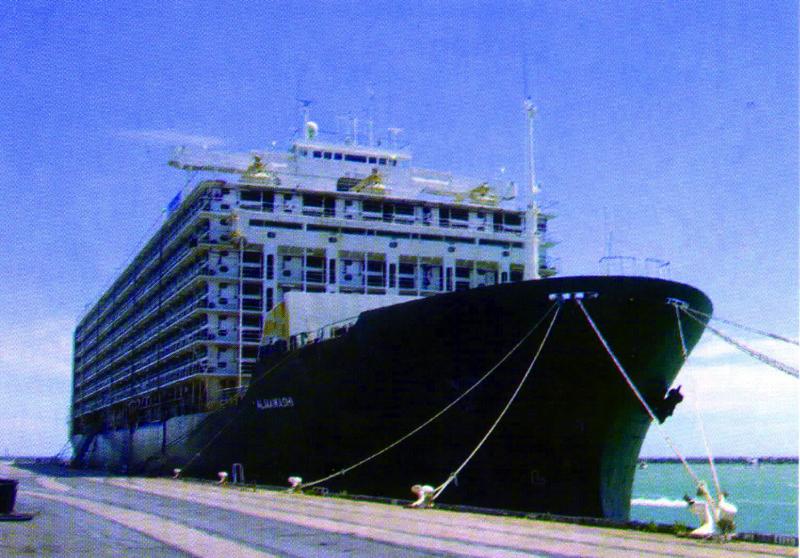The Triumph Of Captain Roman Alcantara
 WAGING A 21st CENTURY SEA BATTLE THROUGH OFW LEADERSHIP
WAGING A 21st CENTURY SEA BATTLE THROUGH OFW LEADERSHIP
By Norma Hennessy
We thank Attorney Peter B. Payoyo for permission to use this article, which first appeared in the January – May 2006 issue of Parola (the Tagalog word for ‘lighthouse’), the newsletter/magazine published by the Philippine Seafarers Assistance Programme (PSAP) www.psap-parola.org/, a 25-year-old non-profit foundation based in Rotterdam, the Netherlands.
Captain Roman Alcantara was in command of the MV Mawashi AL Gasseem, a livestock carrier, when it was arrested in Adelaide, Australia in March 2005. The ship, with its 69 mainly Filipino crew, had actually been sailing the previous month without any provisions. The ship was arrested after a Danish company, OW Bunker and Trading, sued for non-payment for fuel.

Captain Roman Alcantara
At the time of the arrest, the crew had not been paid their wages for many months. Their families had also not received their monthly allotments. An offer of assistance to the crew was initially made by the Maritime Union of Australia. But Captain Alcantara carefully declined, fearing the repercussion of getting his crew and himself blacklisted in the maritime industry in the Philippines. He had hoped that the ship’s Kuwaiti owners would settle matters eventually.
However, the owners, through their agent in Australia, soon issued orders to stop all disbursements and transactions on the ship, in practical effect abandoning the ship and the crew. It was then that Captain Alcantara, after consulting with his men, took up the offer of assistance from the Maritime Union of Australia. The MUA, with the help of the ITF in Australia, provided the sailors with legal representation, the Holding Redlich law offices, based in Melbourne.


For the next six months, during court litigation, Captain Alcantara and his crew remained onboard and dutifully kept their daily tasks of maintaining the ship in tip top shape. In the meantime, OW Bunker and Trading was initially ordered by the court, on humanitarian grounds, to provide for the basic fuel maintenance of the ship and the medical and food provisions of the crew.
The long wait for the court’s final decision proved to be a real ordeal for Captain Alcantara and his men. The crew were confronted with every kind of bleak uncertainty: their voyage, their welfare, their careers, the future of their children and their families. Stranded in a strange place, they did not even have the money to buy telephone cards to call their loved ones back home.
The prayers of skipper Alcantara were slowly but surely heard. The Apostleship of the Sea of South Australia, headed by Richard Lloyd, lent a compassionate hand to the crew. Soon, news of the abandoned crew spread to the Filipino community in Adelaide, who rallied all kinds of support for Captain Alcantara and his men. Masses were celebrated on board the vessel, barbecue gatherings, bus trips and picnics were organized for the crew, and many of them were invited to private homes for meals. Cash donations were also collected for telephone cards.
Finally, after seven agonizing months, an Australian Federal Court rendered a decision in September 2005 to put the vessel up for sale and, from the sale proceeds, to pay the crew’s wages. To the crew’s relief, the court also ordered the repatriation of some 35 crew members.
More good news was coming for Captain Alcantara. Owing largely to the good maintenance of the ship, the vessel was sold at an auction in October to the best of four bidders, the Liberian-based Hijazi & Ghosheh Company.
During the sale proceedings, the new owners had insisted that the ship was to be captained by the same Filipino shipmaster but crewed by Pakistani recruits. But setting aside his personal advantage, Captain Alcantara bargained instead for the rehiring of the old crew, or at least the employment of Filipino sailors.
At the end of the negotiations, the new owner not only rehired all the Filipino crew, including those who were repatriated earlier, but also agreed to improved conditions and a better compensation package for the crew.
On 5 November 2005 the vessel officially started operations under its new name, the MV Al Mawashi. On the same day, members of the Filipino-Australian community, the Philippine Community Herald Newspaper, and the Apostleship of the Sea, presented a special plaque, Gawad Dangal Pilipino-Australia, to Captain Roman B. Alcantara, Jr, in recognition of his exemplary leadership. For their remarkable conduct, a Parchment of Appreciation was also given to each member of the crew.
The vessel, re-born under the command of Captain Alcantara and manned by 69 Filipino sailors, left South Australian waters on 23 November.
Note by Attorney Peter B. Payoyo, editor, Payola: This article was contributed by Norma Hennessy, a correspondent for the Philippine Community Herald Newspaper, Australia, at the request of Parola. Norma’s coverage of Captain Alcantara’s travails and triumph was also featured in the editorial page of the Philippine Star, ‘A hero from a land of heroes’, BY THE WAY, Max Soliven, 2 Jan. 2006. Ms Hennessy, author of ‘A Journey in Antipodean Land (Filipino Heritage in Australia)’ is also a distinguished Filipina artist. www.hennessyinfolink.com.au READ MORE